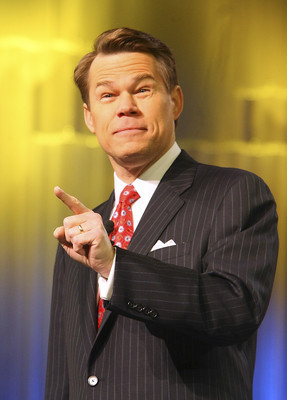Broadcasters set to make their offerings mobile
Chasing active, mobile customers from the office to the gym is an unfamiliar role for the industry that created the couch potato.
But that's exactly what television and radio station owners and network executives will have to do -- or face losing billions of dollars to new media.
That was the message Monday as more than 100,000 broadcast industry workers converged on Las Vegas for the National Association of Broadcasters convention.
The event, held through Thursday at the Las Vegas Convention Center and Las Vegas Hilton, is the industry's largest gathering. In recent years it has broadened to include more talk of mobile devices such as phones and laptop computers executives hope to equip with hardware to receive broadcast signals.
One offshoot of the broadcasters' group estimates conventional television and radio companies can rake in an extra $2 billion or more annually through advertising on mobile devices.
"Just imagine, live television on 345 million devices," David Rehr, the broadcasters group's president and chief executive officer, said during a breakfast dedicated to mobile television. "That would be awesome, and it is going to happen."
To capture that audience, the industry group wants broadcasters to rally behind one of three technologies that would enable mobile phones and computers to receive signals from as far as 40 miles away from modified television and radio towers.
Rehr and others urged the broadcasters at the breakfast meeting to settle on a technology by Feb. 1 -- the date traditional analog signals will be replaced by digital, over-the-air broadcasts.
Much of the focus on that date has been related to the converter boxes that consumers who use rabbit-ear antennas to pick up over-the-air signals will need to receive broadcasts.
But broadcasting industry leaders are also looking at how to take advantage of new opportunities the switch will bring.
"Service is going to look a lot like high quality, digital television," said John Eck, president of NBC TV Network and Media Works. "To get it on a live basis will be the big advance here."
Proponents of the technology say it will be an upgrade from video and audio delivered via the Internet or mobile phone networks.
They also say broadcast television and radio stations are in a better position to provide the service because they already own network infrastructure, local and national content and have relationships with advertisers who would provide the revenue.
Mobile broadcast would use receivers embedded in devices to pick up signals from traditional television and radio stations, as opposed to most mobile video today, which is stored on a device or delivered point-to-point by cellular and broadband carriers.
"That gives us an opportunity," said Brandon Burgess, chairman of the Open Mobile Video Coalition. "Once we have a standard established, everyone in this room can go out and compete."
Technology is already being tested in the field in San Francisco and Las Vegas in anticipation of the 2009 transition from analog to digital signals on the airwaves.
In addition to covering broadcast trends, the NAB show includes an exhibition of TV and radio station hardware and serves as a pep rally for the industry.
During an award ceremony welcome event Monday morning, an audience at the Hilton heard from longtime radio and television journalist Charles Osgood and actor Tim Robbins.
Robbins, who played in critically acclaimed films such as "The Shawshank Redemption" and "Mystic River" as well as lower-profile roles in "Top Gun" and "Howard the Duck," delivered the most pointed remarks.
He made mocking reference to old radio programs such as "Amos 'n Andy," which perpetuated racial stereotypes, and criticized the media's current fascination with chasing celebrities.
"You can lift us up to a more enlightened age," Robbins told the broadcasters. "Or you can hide behind that adage, 'I'm just a businessman, I provide what the audience wants.' "
Contact reporter Benjamin Spillman at bspillman@reviewjournal.com or 702-477-3861.























